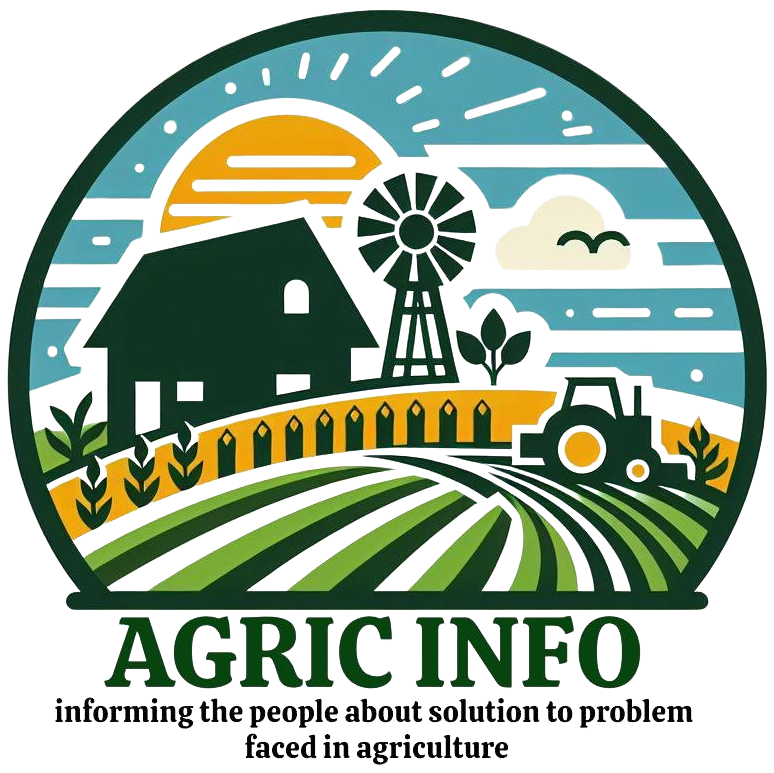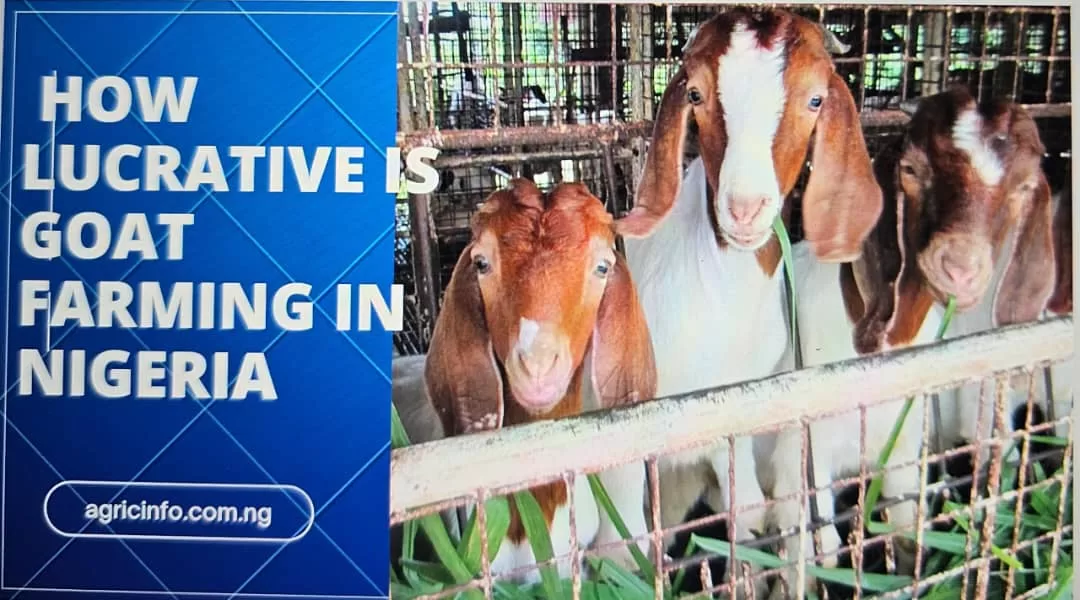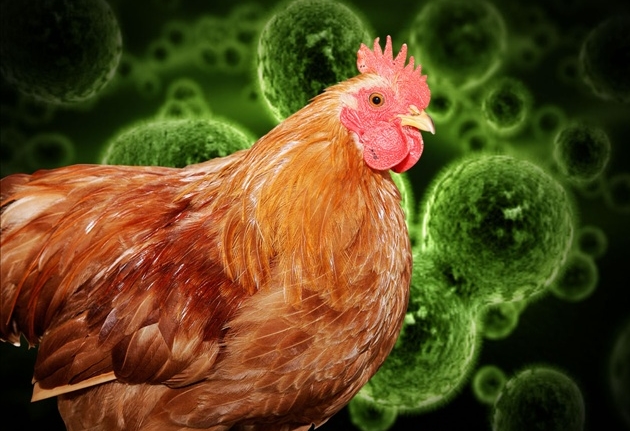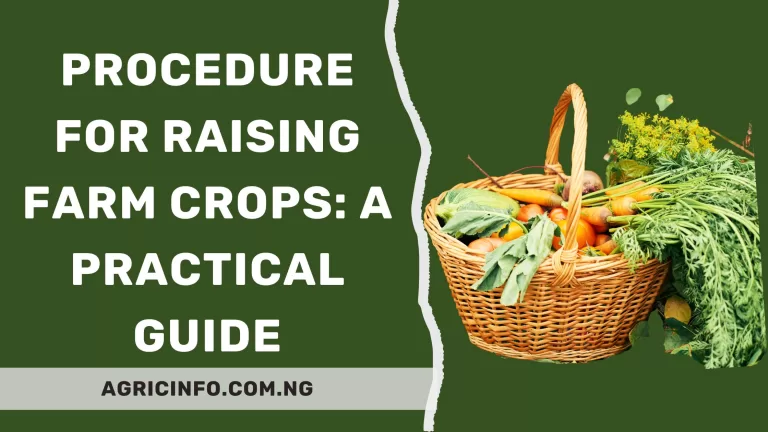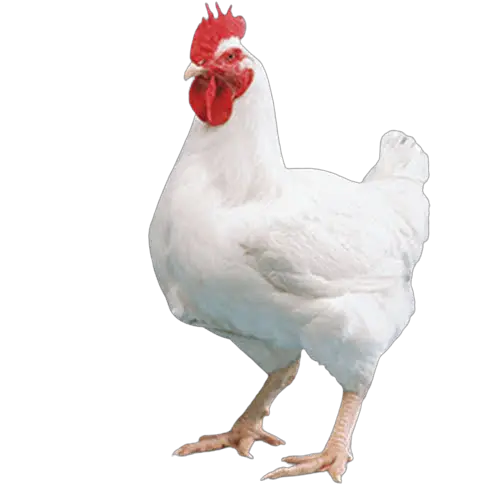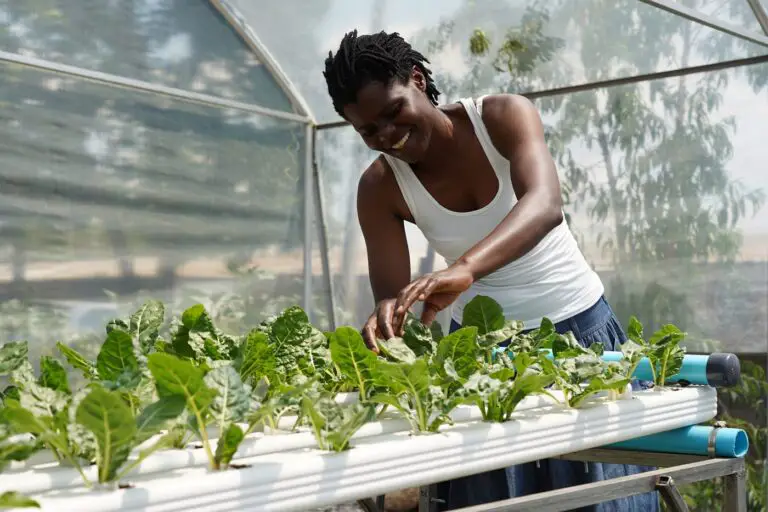How Lucrative is Goat Farming in Nigeria
Are you thinking of starting a side hustle or even a full-blown business? Goat farming in Nigeria is a pretty big deal, and it could be a great way to make some serious money. Now, before you picture a smelly farmyard, hold on! Goat farming can be surprisingly manageable. Plus, there’s a good reason why it’s gaining popularity. Knowing how lucrative is goat farming in Nigeria is very essential.
Imagine making real money just by selling goats to customers or people who need them for a ceremony. Interesting right? In this post, we will discuss the nitty-gritty of goat farming in Nigeria. We’ll talk about how lucrative it can be, what makes it a good option, and – maybe most importantly – if it’s the right fit for you! You can venture into it.
Before then, you must know what goats and goat farming are all about.
What are Goats?
Goats are adaptable and resilient creatures domesticated for a variety of purposes. It is scientifically known as Capra aegagrus hircus. These animals are cultivated for their meat, milk, and fiber, as well as for their utility as pack animals. Their sophisticated digestive systems enable them to graze on various plant species, making them invaluable for land management and weed control efforts.
With their robust constitution and minimal care requirements, goats are a preferred choice for small-scale farming operations in Nigeria and throughout Africa. They play a vital role in supporting local economies and ways of life.
What is Goat Farming?
Goat farming is raising many goats to get things we use every day, like milk, meat, clothes, and even wallets! It’s like having a pet goat but with a whole herd! Below are why people raise goats:
- Delicious Drinks: Goats give yummy milk that some people find easier to digest than cow milk. This milk can be made into cheese, butter, or even soap!
- Tasty Food: Goat meat, called chevon, is healthy and famous in many places worldwide.
- Cozy Clothes: Some goats, like Angoras, have super soft fur called mohair. This mohair is used to make warm clothes like scarves and sweaters.
- Leather Goods: Strong leather can be made from goat skin, which is helpful for wallets, belts, and shoes.
Types of Goat Farming in Nigeria
Below are the ten (10) Goat Farming businesses across Nigeria and Africa:
- Meat Goat Farming
- Dairy Goat Farming
- Goat Breeding
- Angora Goat Farming
- Pack Goat Farming
- Organic Goat Farming
- Commercial Goat Farming
- Integrated Goat Farming
- Fodder Goat Farming
- Recreational Goat Farming
Read more:Cow Range Business in Nigeria
Meat Goat Farming
Focused on cultivating goats for their meat, this type of farming stands out as a profitable business due to the consistently high demand for goat meat across various markets. Entrepreneurs in this sector invest in breeds known for their meat quality, implementing strategies to maximize growth and health for better yields.
Dairy Goat Farming
This branch of goat farming centers around milk production. Though not as widespread as meat production in Nigeria and Africa, dairy goat farming holds a niche market with considerable growth potential. Farmers in this sector are dedicated to maintaining high milk-producing goat breeds and ensuring optimal milking practices for quality produce.
Goat Breeding
This specialized area focuses on raising goats for breeding. Breeders aim to enhance the genetic quality of goats, either for sale to other farmers looking to improve their herds or for the betterment of their stock. This venture requires a deep understanding of genetics, goat health, and reproductive management.
Angora Goat Farming
Exclusive to the rearing of Angora goats, this sector produces mohair, a luxurious fiber highly sought after in the textile industry. Farmers in this domain must have a keen understanding of fiber care, health management, and sustainable farming practices to ensure the production of high-quality mohair.
Pack Goat Farming
This is an unconventional yet practical approach to goat farming. This involves training goats to carry packs or assist with labor-intensive tasks, instrumental in rugged terrains or for agricultural businesses. This unique form of agriculture provides utility and promotes the versatility and intelligence of goats as working animals.
Organic Goat Farming
With a growing demand for organically produced goods, this sector emphasizes rearing goats in a natural environment free from synthetic chemicals such as antibiotics or hormones. Organic goat farmers commit to sustainable practices, including using organic feed and allowing goats free range, ensuring a healthier animal lifestyle, and producing organic goat products for health-conscious consumers.
Commercial Goat Farming
This large-scale operation focuses on mass-producing goats for various products, including meat, milk, and fiber. Commercial goat farming comprises intensive farming techniques, strategic breeding programs, and advanced health management to ensure high productivity and profitability.
Integrated Goat Farming
This innovative approach combines goat farming with other forms of agriculture, such as crop cultivation or aquaculture, to create a symbiotic ecosystem. Integrated farming maximizes the use of land and resources, allowing for diverse revenue streams while promoting sustainable agricultural practices.
Fodder Goat Farming
This sector specializes in raising goats primarily for fodder production, which is used to feed other livestock. It is a critical component of the livestock industry, ensuring the availability of quality feed to maintain the health and productivity of various animals.
Recreational Goat Farming
It is geared towards leisure and education; recreational goat farming involves keeping goats for purposes such as petting zoos, educational farms, or simply raising these versatile animals. This form of farming provides a unique opportunity to connect with nature and educate the public about agriculture and animal care.
About Goat Farming in Nigeria
Goat farming or raising goats is financially rewarding and culturally significant in many parts of Nigeria. Goats are integral to various traditional ceremonies and festivities, often given as gifts or used in communal feasts. This cultural relevance further boosts the demand for goats, adding another layer to the economic viability of goat farming.
Moreover, goat products like milk and cheese are gaining popularity for their nutritional benefits, including being more accessible to digest than cow’s milk for many people. This increasing demand for goat-derived products presents an opportunity for expansion and innovation within the goat farming industry. Additionally, the production of goat fiber, such as cashmere and mohair, offers another avenue for diversification and income.
With proper management, sustainable practices, and an understanding of market dynamics, goat farming can not only support livelihoods but also contribute to food security and nutritional needs in both rural and urban areas. Its adaptability to various environments and the relatively low startup and maintenance cost make it an appealing option for many aspiring and established farmers.
Some Notable Facts about Goat Farming in Nigeria
Goat farming is a deeply rooted agricultural practice in Africa, offering a longstanding source of nutrition, dairy, and economic benefit to numerous households. It is known for their resilience and ability to adapt to various climates; goats are a favored choice among smallholder farmers throughout the continent.
Nigeria tops the list as the leading producer of goat meat in Africa, with Sudan and Kenya also contributing significantly. These animals are valued not only for their meat but also for their milk and hides, which are processed into leather. With the capacity to give birth to up to two kids annually, goats are considered prolific breeders. Their care is straightforward, necessitating minimal upkeep.
Rich in protein, fat, and essential minerals, goat milk produces a range of dairy products like cheese and yogurt. Compared to beef and pork, goat meat is leaner, offering a healthy alternative rich in protein and iron. Goats also play an ecological role, aiding weed management and reducing bushfire risks in rural locales.
Capable of thriving in diverse settings, including arid zones, goats present a viable option where other livestock might struggle. Recognized for its economic potential, goat farming is poised for growth in several African nations, driven by strong demand for both meat and dairy.
In many African societies, goats are a traditional form of currency and can be a significant aspect of marriage dowries or sold for financial gain. This farming practice offers a pathway out of poverty and creates job opportunities in rural regions. Goats have a varied diet, making them an eco-friendly farming option.
Notably disease-resistant, goats often withstand common livestock ailments better than other animals. Their maintenance is low-key, eliminating the need for costly gear or infrastructure. This makes goat farming an accessible venture for women and African youth, requiring minimal initial investment.
Goat dung is a prized fertilizer, enhancing soil health and boosting crop production. Goat farming can ensure a steady income year-round, whether through meat, dairy, or breeding stock sale. It promises to enhance food security across the continent by offering a reliable protein source and other vital nutrients.
Why Should I Start Goat Farming in Nigeria?
Goat farming stands out as a lucrative and beneficial agricultural practice, particularly in Nigeria, for several reasons. Each benefit not only contributes to the economic viability of goat farming but also supports sustainable agricultural practices and community development.
Below are ten (10) reasons farmers prefer goat farming in Nigeria:
- High Economic Potential
- Affordable Initial Investment
- Diverse Product Offerings
- Popularity of Goat Meat
- Nutritional Benefits of Goat Milk
- Low Maintenance Requirements
- Rapid Reproduction Rate
- Environmental Sustainability
- Employment Opportunities
- Organic Fertilizer Production
High Economic Potential
Goat farming is recognized for its considerable profit-making potential. The demand for goat-related products is consistently strong, providing farmers with a steady source of income. This financial viability stems from the market’s growing demand for goat meat and milk, making it a promising investment for those involved in agriculture.
Affordable Initial Investment
Unlike other livestock ventures that might require substantial capital for infrastructure and start-up, goat farming is comparatively cost-effective. The lower financial barrier to entry makes it an accessible option for many aspiring farmers, including smallholders looking to diversify their income sources.
Diverse Product Offerings
Goats are multi-purpose livestock, offering various products that include meat, milk, hides, and manure. Each product has its market, further enhancing the income-generating potential of goat farming. For instance, goat meat is known for its nutritional value and flavor, making it a preferred choice in many cuisines. Goat milk is equally prized, especially for its use in dairy products like cheese and yogurt, known for their distinctive taste and health benefits.
Popularity of Goat Meat
In Nigeria, goat meat is a staple, celebrated for its culinary versatility and nutritional profile. The high demand for goat meat ensures a steady market, providing farmers with a reliable source of revenue.
Nutritional Benefits of Goat Milk
Goat milk is nutritious and more accessible to digest for some people compared to cow milk. Its use in dairy product production like cheese and yogurt adds value to the goat farming business, catering to a niche market that prefers these products for their unique taste and health advantages.
Low Maintenance Requirements
Goats are known for their resilience and adaptability. They require minimal care compared to other livestock, thriving even in low-resource settings without advanced infrastructure. This ease of maintenance reduces operational costs and labor, making goat farming an efficient agricultural practice.
Rapid Reproduction Rate
Goats have a high fertility rate and can reproduce multiple offspring in a single birth. This characteristic allows farmers to quickly expand their herds, increasing their production capacity and potential for income generation.
Environmental Sustainability
Goat farming is environmentally sustainable. Goats can graze on marginal lands that might not be suitable for other agriculture or livestock, reducing the pressure on arable lands and contributing to land management practices that prevent degradation.
Employment Opportunities
The goat farming industry can be a significant source of employment, particularly in rural areas where job opportunities might be scarce. It encompasses various activities, including farm management, feed production, veterinary services, and market sales, thus supporting local economies.
Organic Fertilizer Production
The manure produced by goats is an excellent source of organic fertilizer. Rich in nutrients, goat manure can enhance soil fertility, promoting healthier crop growth and higher yields. This aspect of goat farming not only contributes to the sustainability of the practice but also supports crop production activities, creating a synergistic relationship between different agricultural sectors.
Is Goat Beneficial to Health?
Yes, goats have numerous health benefits. Goat farming offers many health advantages, primarily due to the nutritional value of goat products. Goat meat, known for its high-quality protein, is easily absorbed by the body and supplies all vital amino acids necessary to repair and grow muscle, tissue, and cellular structures.
Compared to other red meats, such as beef and pork, goat meat is a leaner option with less fat content, making it suitable for those mindful of their fat consumption. It’s an outstanding source of iron, pivotal for creating hemoglobin in the blood, boosting immunity, and enhancing mental performance.
Moreover, goat meat is abundant in vitamin B12, which is crucial for the nervous system’s health and the formation of red blood cells. Its lower cholesterol levels, compared to beef and pork, offer a heart-healthier choice for individuals with concerns about cholesterol.
Potassium-rich goat meat aids blood pressure regulation and fluid balance within the body. It also contains selenium, a mineral that strengthens the immune system and shields against infections. Its easy digestibility and healthy fats contribute to improved digestive health.
Goat meat’s calcium content supports robust bones and teeth, while its omega-3 fatty acids, known for their anti-inflammatory effects, help reduce bodily inflammation. Additionally, its iron content is effective in preventing anemia.
Goat milk, another product of goat farming, is beneficial for skin health due to its high vitamin A content. For those aiming to manage their weight, goat meat, being lean and low in calories and fats, is an excellent choice.
The presence of phosphorus in goat meat is vital for the health of bones and teeth and aids in maintaining kidney function.
Lastly, the iodine found in goat meat is essential for thyroid health, helping to regulate its function and prevent disorders.
What are the Types Of Goats Used For Goat Farming In Nigeria and Africa?
In Nigeria and across Africa, various goat breeds are integral to goat farming, each with unique characteristics:
- The West African Dwarf Goat is a compact breed favored in Nigeria and surrounding West African nations. Their resilience and adaptability make them ideal for smaller farming operations.
- Originating from North Africa and the Middle East, Nubian Goats are distinguished by their larger size and high milk yield, making them versatile for dairy and meat.
- Boer Goats, hailing from South Africa, are celebrated for their rapid growth and superior meat quality, making them a choice breed for commercial farming in Nigeria and beyond.
- Saanen Goats, with their origins in Switzerland, are renowned for their impressive milk production, making them a staple in dairy farming worldwide.
- Alpine Goats, known for their medium build, excel in milk production and meat quality. Their ability to adapt to various climates makes them a versatile choice for farmers.
- Spanish Goats are praised for their toughness and ability to adapt, making them well-suited for meat production in many African regions.
- Kiko Goats from New Zealand are noted for their swift growth and robustness, increasingly becoming a preferred choice for meat farming in Africa.
How Lucrative is Goat Farming in Nigeria
Goat farming plays a significant role in Nigeria for several reasons. It represents a viable and profitable form of agriculture that can substantially contribute to the national economy. One of the benefits of goat farming is its lower expenses compared to other types of livestock businesses.
However, goat farming in Nigeria holds significant potential for profitability due to a combination of socio-economic, environmental, and biological factors. These elements make goat farming an attractive agricultural endeavor in the region.
Socio-Economic Factors
1. Cultural Preference and Consumption Patterns
In Nigeria, goat meat is deeply ingrained in the culinary traditions and is preferred over other meats for its unique taste and texture. This cultural preference ensures a constant demand in local markets, festive occasions, and ceremonial functions, providing goat farmers with a vast and reliable consumer base.
2. Growing Population
With Nigeria being one of the most populous countries in Africa, the demand for protein sources like goat meat is ever-increasing. This population growth translates to a larger market for goat products, ensuring sustained demand and potentially higher prices.
3. Urbanization and Income Growth
As urbanization increases and incomes rise, dietary patterns evolve, often leading to greater meat consumption. Urban dwellers with higher disposable incomes may prefer quality goat meat, opening up premium markets for goat farmers.
Environmental and Biological Factors
1. Adaptability of Goats
Goats are incredibly resilient and can adapt to a wide range of environmental conditions present in Nigeria. This adaptability reduces the risk of loss due to climate-related challenges, making goat farming a less risky agricultural venture than other livestock farming.
2. Efficient Reproduction
Goats have a reputation for their breeding efficiency, capable of producing multiple offspring in a single birth. This trait allows for rapid herd expansion and increased meat or milk production without significant increases in investment.
3. Low Maintenance and Upkeep
Goats are known for their ability to forage and feed on various plants, reducing the need for expensive feed. This natural grazing ability can lead to lower operational costs for the farmer, enhancing profit margins.
Economic Viability and Support Systems
1. Access to Markets
With the proliferation of local and regional markets in Nigeria, goat farmers have ample opportunities to sell their products. Infrastructure and transportation development has also facilitated easier access to these markets, ensuring farmers can sell their products efficiently.
2. Governmental and Developmental Support
Various government programs and initiatives to boost agriculture in Nigeria include support for goat farming. These programs may offer financial assistance, training in modern farming techniques, and access to veterinary services, which can significantly enhance the profitability of goat farming ventures.
3. Community and Cooperative Models
In many rural areas, community-based goat farming and cooperative models have proven successful. These models provide shared resources, collective bargaining power in markets, and support systems for individual farmers, reducing risks and increasing profitability.
In simple terms, below are factors that influence the lucrativeness of goat farming in Nigeria.
- High Demand for Goat Meat
- Low Initial Investment
- Favorable Climatic Conditions
- Short Gestation Period
- Multiple Revenue Streams
- Government and NGO Support
How to Start a Goat Farming Business in Nigeria
Starting a goat farming business in Nigeria offers a promising opportunity for entrepreneurs. To ensure success, it’s crucial to follow a structured approach.
Below are guidelines on how to start a goat farming business:
- Conduct Thorough Market Research
- Choose the Most Suitable Goat Breed
- Secure Appropriate Land
- Construct Adequate Shelter
- Arrange a Reliable Feed Supply
- Purchase Healthy Goats
- Implement a Comprehensive Health Care Program
- Develop a Strategic Breeding Plan
- Craft an Effective Marketing Plan
- Join Professional Associations
Conduct Thorough Market Research
Initially, go into an extensive market analysis to grasp the nuances of demand, identify your competitors, and gauge the market’s profitability. Investigating local meat markets or dairy processors, for instance, can reveal the current demand for goat products and allow you to tailor your business plan accordingly.
Choose the Most Suitable Goat Breed
Selecting the right goat breed is pivotal. Your choice should be informed by the local climate, the breed’s adaptability, and the specific demands of your target market. If your region has a penchant for goat cheese, breeds known for high milk production, like Alpine or Toggenburg goats, might be ideal.
Secure Appropriate Land
Identifying and securing a plot of land that can accommodate your goats is essential. This land should offer ample space for grazing, comfortable housing, and efficient feeding operations. For example, securing a plot with natural forage can reduce feed costs and support healthier livestock.
Construct Adequate Shelter
Design and build a shelter that provides comfort and protection for your goats against extreme weather conditions. The shelter should be spacious, well-ventilated, and easy to clean. Implementing features like raised bedding areas can keep the goats dry and prevent health issues.
Arrange a Reliable Feed Supply
Whether you cultivate your feed or procure it from suppliers, ensuring the nutritional adequacy of the feed is crucial. Integrating a diet that includes forage, grains, and essential minerals can promote the health and productivity of your goats. For example, planting forage crops such as alfalfa or clover can supplement purchased feeds.
Purchase Healthy Goats
Acquiring your initial herd from reputable sources is critical. Look for goats that are robust, active, and free from visible health issues. Engaging with experienced breeders or attending livestock auctions can effectively find quality stock.
Implement a Comprehensive Health Care Program
Regular veterinary care, including vaccinations and deworming, is fundamental to maintaining a healthy herd. Establishing a relationship with a local veterinarian can ensure timely access to health care and advice. For example, preventive measures against common ailments like foot rot or parasites can save costs and prevent herd losses.
Develop a Strategic Breeding Plan
A well-thought-out breeding strategy can enhance your herd’s quality and productivity. Selecting goats with desirable traits for breeding can lead to improvements in milk yield, meat quality, or disease resistance, depending on your business focus.
Craft an Effective Marketing Plan
Identify and connect with potential buyers or markets for your goat products. This could involve direct sales to consumers, partnerships with local restaurants, or supplying products to specialty food stores. Tailoring your marketing efforts to highlight the quality and uniqueness of your products can attract premium prices.
Join Professional Associations
Membership in goat farming or agricultural associations can provide numerous benefits, including access to the latest industry research, training opportunities, and a platform for networking with peers. Participation in local agricultural fairs or events can enhance your farm’s visibility and reputation.
What are the Types Of Equipment & Tools Used In The Goat Farming Business In Nigeria or Africa?
In the goat farming business in Nigeria and other parts of Africa, various specialized tools and equipment are essential for efficient operations. Below is a breakdown of the types of equipment and tools and their uses:
For Slaughter and Preparation
- A sharp knife is crucial for making precise incisions during the slaughter process.
- A humane restraining device ensures the animal remains still, minimizing distress.
- A bleeding cone facilitates the controlled bleeding of the animal, an essential step before proceeding with the slaughter.
For Evisceration
- A gutting hook aids in opening the animal’s abdomen and removing internal organs efficiently.
- A stable gutting table provides an appropriate surface for this delicate task.
- A gutbucket collects the removed organs and waste, keeping the area clean.
For Skinning
- A skinning knife allows for the manual removal of the animal’s hide with precision.
- Skinning machines automate the process, using rotating drums and blades to strip the skin efficiently.
For Washing and Cleaning
- A range of washing tools, including hoses and brushes, are used to clean the carcass post-processing thoroughly.
For Meat Processing
- A meat saw is used to divide the carcass into manageable sections.
- Meat grinders transform chunks of meat into minced meat, ready for further processing or cooking.
- Meat slicers cut the meat into uniform slices, ideal for packaging and sale.
For Packaging
- Vacuum sealers extend the shelf life of meat products by removing air from the packaging.
- Heat sealers ensure the packaging is securely closed to maintain freshness and prevent contamination.
- Packaging materials designed to be food-safe can also be customized for branding purposes.
For Storage
- Proper storage is facilitated by refrigerators or freezers, which are essential for preserving the quality of the meat until it reaches the consumer.
How can I Sell Goat Products In Nigeria or Africa?
Below are how to sell your goat products:
- Selling at Local Markets: Offer goat products at local markets, including meat shops and grocery stores.
- Bulk Sales to Meat Processors: Large meat processing firms often purchase goat products in substantial quantities for both local and overseas distribution.
- Direct Consumer Sales: Consider selling your goat products directly to customers via a farm shop or an online platform.
- Exploring Exports: With the international demand for goat meat on the rise, exporting your products could be a viable option.
- Partnering with Restaurants: Form partnerships with local eateries that feature goat meat on their menus and supply them with your products.
- Social Media Promotion: Leverage platforms like Instagram, Twitter, and Facebook to display your products and connect with a broader audience.
- Food Expo Participation: Showcase your goat products at food expos and exhibitions to attract potential customers.
- Hosting Farm Tours: Invite people to visit your goat farm to learn about the farming process and purchase your products directly.
- Community Engagement: Get involved with local community-supported agriculture programs to offer your products to nearby residents.
- Supplying to Dairy Producers: If your farm produces goat milk, consider supplying it to dairy companies that incorporate it into their products.
What are the Challenges Of Goat Farming In Nigeria and Africa?
Goat farming in Nigeria and Africa has some challenges that significantly affect the sustainability and profitability of goat farming. These hurdles range from financial constraints to environmental impacts, each adding complexity to goat farming operations.
- Financial Barriers
- Breeding and Genetic Management
- Disease Control and Health Management
- Access to Veterinary Services
- Market Accessibility and Value Chain Issues
- Nutritional Requirements
- Adverse Effects of Climate Change
- Skill Development and Knowledge Transfer
- Infrastructure and Logical Challenges
- Predation and Security Concerns
- Predation and Security Concerns
- Policy and Institutional Support
Financial Barriers
One of the primary goat farming challenges faced by goat farmers is the lack of financial resources. Securing loans or investments to enhance farming operations, invest in quality breeds, or expand farm infrastructure is often a daunting task. This financial squeeze hampers the ability of farmers to adopt modern farming techniques or scale their operations to meet market demand.
Breeding and Genetic Management
The absence of structured breeding programs leads to issues with goat genetics, affecting the quality and health of the livestock. Without access to superior breeds and effective breeding strategies, farmers may find their herds plagued by reduced fertility rates, lower meat and milk yields, and increased susceptibility to diseases.
Disease Control and Health Management
Goats are vulnerable to infectious diseases that can decimate herds if not adequately managed. The challenge is compounded by the lack of comprehensive health management practices and the difficulties in accessing timely veterinary care, particularly in remote farming communities.
Access to Veterinary Services
The scarcity of veterinary services in rural areas poses a significant challenge. Many farmers operate without the necessary guidance and support from veterinary professionals, making it difficult to prevent and control diseases effectively, manage herd health, and ensure the well-being of their animals.
Market Accessibility and Value Chain Issues
Navigating the market landscape is a complex challenge for goat farmers. Limited access to markets, fluctuating prices, and the lack of a structured value chain can leave farmers with minimal bargaining power and reduced profit margins. This challenge is exacerbated by the absence of organized platforms for selling goat products and the high costs associated with transportation to urban markets.
Nutritional Requirements
Proper nutrition is vital for the health and productivity of goats. However, the availability and affordability of quality feed are significant concerns, particularly in regions where fodder resources are scarce or of poor quality. Seasonal variations further exacerbate this issue, leading to fluctuations in feed availability and nutritional content.
Adverse Effects of Climate Change
The agricultural sector is susceptible to climate variability, and goat farming is no exception. Extreme weather events, such as droughts, floods, and erratic rainfall patterns, directly impact feed and water availability, herd health, and overall farm productivity. Farmers must contend with these environmental challenges while maintaining sustainable farming practices.
Skill Development and Knowledge Transfer
Many goat farmers lack formal training in animal husbandry and farm management. This gap in knowledge and skills can lead to suboptimal farming practices, affecting the overall productivity and sustainability of goat farming operations. There is a critical need for capacity-building initiatives and knowledge transfer to empower farmers with the skills to manage their farms effectively.
Land Use and Grazing Rights
Access to grazing land is a contentious issue, especially in densely populated areas or regions where agricultural land is in high demand. Conflicts over land use rights can restrict the availability of grazing spaces, leading to overgrazing, land degradation, and disputes among community members.
Infrastructure and Logistical Challenges
The lack of basic infrastructure, such as roads, electricity, and water supply, poses logistical challenges for goat farmers. These challenges impact the transportation of goods to market, the provision of water and other essential resources for farming activities, and the overall efficiency of farm operations.
Predation and Security Concerns
Rural goat farms are often vulnerable to attacks by predators, which can lead to significant losses. Beyond natural predators, the threat of theft is a constant concern, with farmers needing to invest in security measures to protect their valuable livestock.
High Input Costs
The cost of inputs, such as feed, veterinary services, and labor, can be prohibitively high, particularly for small-scale farmers. These costs eat into profit margins, making it challenging for farmers to sustain their operations over the long term.
Policy and Institutional Support
The lack of supportive policies and institutional frameworks for goat farming hinders the development of this sector. Farmers often find themselves navigating a complex regulatory environment with minimal support from government or non-governmental organizations.
Gender Dynamics and Inclusivity
Women play a significant role in goat farming, particularly in rural areas. However, they often face more significant challenges in accessing resources, training, and support services due to prevailing gender norms and inequalities. Addressing these disparities is crucial for promoting inclusivity and empowering women within the goat farming sector.
Addressing these challenges requires a coordinated approach that involves stakeholders at all levels, including farmers, government agencies, non-governmental organizations, and the private sector. By tackling these issues head-on, there is potential to transform goat farming in Nigeria and Africa into a more resilient, productive, and sustainable industry.
Conclusion
To sum up, goat farming within Nigeria and Africa holds considerable promise for profitability and economic growth. The rising market demand for goat-derived products, such as meat, milk, and hides, opens vast prospects for both entrepreneurs and agriculturalists. Nonetheless, this business comes with obstacles, including disease control, veterinary service availability, and infrastructure limitations, which can impact both yields and financial outcomes.
Addressing health management, enhancing feed quality and quantity, and resolving market access and pricing challenges is crucial for optimizing the sector’s potential. Despite these challenges, goat farming can significantly contribute to wealth building, job creation, and alleviating poverty, especially in rural areas. Equipped with adequate resources, expertise, and know-how, individuals can establish prosperous and enduring goat farming enterprises, bolstering the agricultural industry’s growth in these regions.
